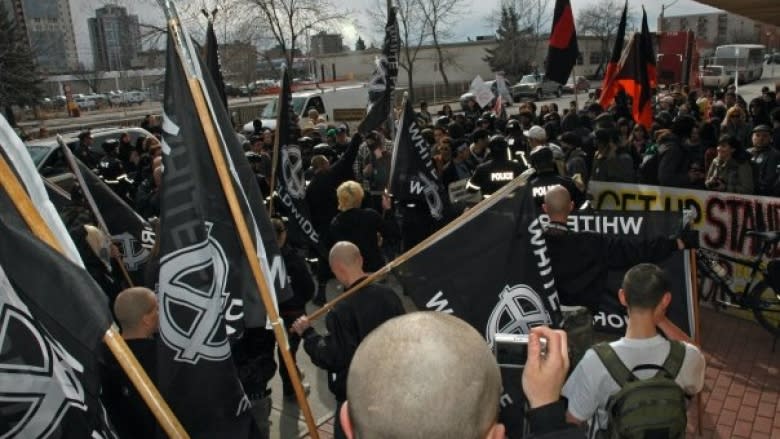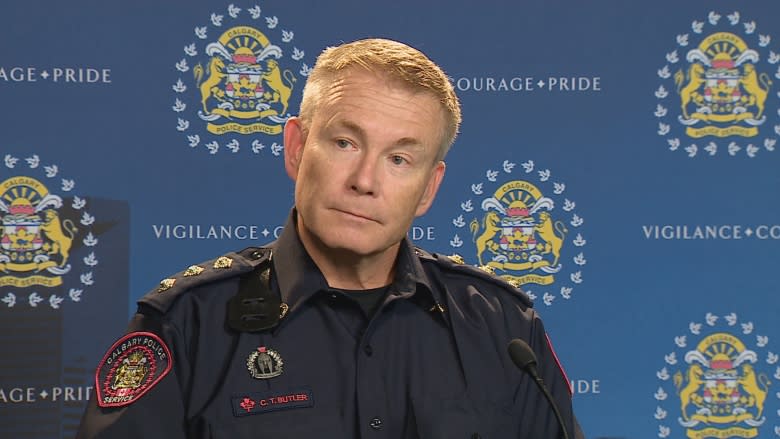Calgary police say it would be 'naive' to think Charlottesville violence couldn't happen here
Calgary police say it would be "naive" to think the violence on display in Charlottesville, Va., on the weekend couldn't happen here, but they're confident the force is well-prepared to maintain order at local protests.
"We're no strangers to planning for protests," said Insp. Chris Butler, the officer who oversees what's called the public safety unit, responsible for policing protests.
"We have approximately 600 protests every year in Calgary, and most Calgarians are not even aware of that because they come and go and nothing happens."
Butler said planning for protests is led by intelligence gathering and risk assessments, looking at the level of aggression and hate within groups, how eager they are to incite violence in other groups and attempts to counter-measure a police response.
There are approximately 120 trained public safety officers, with dozens on shift in regular roles able to respond quickly to a spontaneous situation, he said.
Groups 'come and go'
In Charlottesville, white supremacists descended on the city and were met with counter-protests. The ensuing clashes turned deadly when a suspected neo-Nazi drove his car into a crowd of anti-fascist protesters, killing 32-year-old Heather Heyer and injuring several others.
Recently in Calgary, a rally by members of Calgary's Street Church turned violent when they clashed with anti-fascist protesters in front of City Hall, taking police by surprise.
Butler said 40 trained officers were on scene in under 12 minutes, but not before fights erupted and bear spray was used.
He said there have always been white supremacist groups in Calgary.
"They come and go. Sometimes they're more visible, more vocal, more bold in their assertions than at other times," he said.
"So I don't think this is anything to get alarmed about. This is nothing we haven't seen before."
U.S. influence
However, Butler said the force is concerned groups within the city could be emboldened by what they're seeing south of the border.
"I think it would be fair to say that we're definitely concerned about an increase in the amount of alt-right, extreme messaging that is leaning towards that it's all right to use violence to accomplish your goals and your objectives," he said.
"That does appear to be a trend that we're monitoring, and we're concerned about it, but we're keeping our eye on it."
Calgary has seen neo-Nazi skinhead marches through downtown in the past decade, but that specific group — the Aryan Guard — has disappeared from the public spotlight.
Lately, groups opposed to Islam have held rallies in front of City Hall, with members of a local militia standing guard.
Freedom of speech and safety
Butler said police perform a balancing act while overseeing protests, ensuring the right to free speech is protected while ensuring public safety is maintained.
"The reality is the opinions of some of these groups, the majority of Calgarians find extremely distasteful and unpleasant," he said.
"What our job is in those situations is, as a police service, to protect their right to express that opinion no matter how distasteful we might find it. They have the right to assemble and express that opinion."
Const. Craig Collins, the hate crimes co-ordinator for the Calgary police, said the service is proactive and that Calgary is a pretty safe place.
"Based on my 25 years of experience working in other police services, do I see the same amount of hate in Calgary as perhaps other areas of the world that I've worked? No, I don't see the same amount of hate. Is there hate in Calgary? There's hate in every city in this world," he said.


